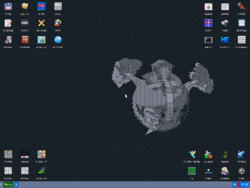Main Page: Difference between revisions
Jump to navigation
Jump to search
No edit summary |
No edit summary |
||
| Line 17: | Line 17: | ||
KolibriOS is an [http://en.wikipedia.org/wiki/Open-source_software open source] [http://en.wikipedia.org/wiki/Operating_system operating system] with a [http://en.wikipedia.org/wiki/Monolithic_kernel monolithic] [http://en.wikipedia.org/wiki/Preemption_(computing) preemptive] [http://en.wikipedia.org/wiki/Kernel_(computer_science) kernel], video drivers, for [http://en.wikipedia.org/wiki/32-bit 32-bit] [http://en.wikipedia.org/wiki/x86_architecture x86 architecture] computers, developed and maintained by The KolibriOS Project Team. KolibriOS is a fork of [http://en.wikipedia.org/wiki/MenuetOS MenuetOS], written entirely in [http://en.wikipedia.org/wiki/FASM FASM] ([http://en.wikipedia.org/wiki/Assembly_language assembly language]). However, [http://en.wikipedia.org/wiki/C C], [http://en.wikipedia.org/wiki/C++ C++], [http://en.wikipedia.org/wiki/Free_Pascal Free Pascal], [http://en.wikipedia.org/wiki/Forth Forth], among other high-level languages and compilers, can also be used in user application development.<br /> | KolibriOS is an [http://en.wikipedia.org/wiki/Open-source_software open source] [http://en.wikipedia.org/wiki/Operating_system operating system] with a [http://en.wikipedia.org/wiki/Monolithic_kernel monolithic] [http://en.wikipedia.org/wiki/Preemption_(computing) preemptive] [http://en.wikipedia.org/wiki/Kernel_(computer_science) kernel], video drivers, for [http://en.wikipedia.org/wiki/32-bit 32-bit] [http://en.wikipedia.org/wiki/x86_architecture x86 architecture] computers, developed and maintained by The KolibriOS Project Team. KolibriOS is a fork of [http://en.wikipedia.org/wiki/MenuetOS MenuetOS], written entirely in [http://en.wikipedia.org/wiki/FASM FASM] ([http://en.wikipedia.org/wiki/Assembly_language assembly language]). However, [http://en.wikipedia.org/wiki/C C], [http://en.wikipedia.org/wiki/C++ C++], [http://en.wikipedia.org/wiki/Free_Pascal Free Pascal], [http://en.wikipedia.org/wiki/Forth Forth], among other high-level languages and compilers, can also be used in user application development.<br /> | ||
English, Russian and | English, Russian and Italian versions are available. | ||
<center> | <center> | ||
Revision as of 17:18, 7 February 2013
| KolibriOS | |
Error creating thumbnail: Unable to save thumbnail to destination
| |
 KolibriOS desktop | |
| Website: | www.kolibrios.org |
| Developed by: | KolibriOS Project Team |
| License: | GPL |
| Kernel type: | Monolithic kernel |
| Working state: | Active |
KolibriOS is an open source operating system with a monolithic preemptive kernel, video drivers, for 32-bit x86 architecture computers, developed and maintained by The KolibriOS Project Team. KolibriOS is a fork of MenuetOS, written entirely in FASM (assembly language). However, C, C++, Free Pascal, Forth, among other high-level languages and compilers, can also be used in user application development.
English, Russian and Italian versions are available.
| Home | FAQ |
|---|---|
| Forum | Documentation |
| Nightly builds | Wanted Features |
| Bug tracker | Changelog |
| Source Repository | Applications |
| Developers File Repository | All categories of the wiki |
KolibriOS Features
- Boots from several devices, NTFS is also supported. You can even start it from Windows (Windows will shutdown).
- Graphical user interface based on VESA.
- Requires only 8 Mb of RAM. (Some versions will boot with as little as 6 Mb)
- Development kit: code editor with a macro-assembler (FASM) integrated.
- Runs on low end systems or older hardware (SystemRequirements)
- Pre-emptive multitasking, streams, parallel execution of system calls.
- Supported file systems are FAT12, FAT16, FAT32 (long names support), NTFS (partially, read only), ext2/ext3/ext4 (partially, read only) and CDFS.
- AC'97 audio codec support for Intel, nForce, nForce2, nForce3, nForce4, SIS7012, FM801, VT8233, VT8233C, VT8235, VT8237, VT8237R, VT8237R Plus and EMU10K1X chipsets.
Branches